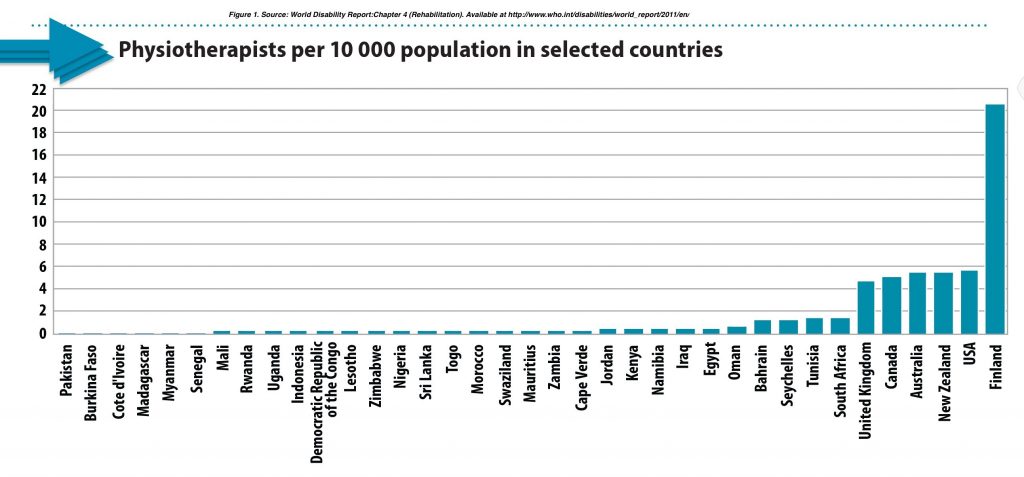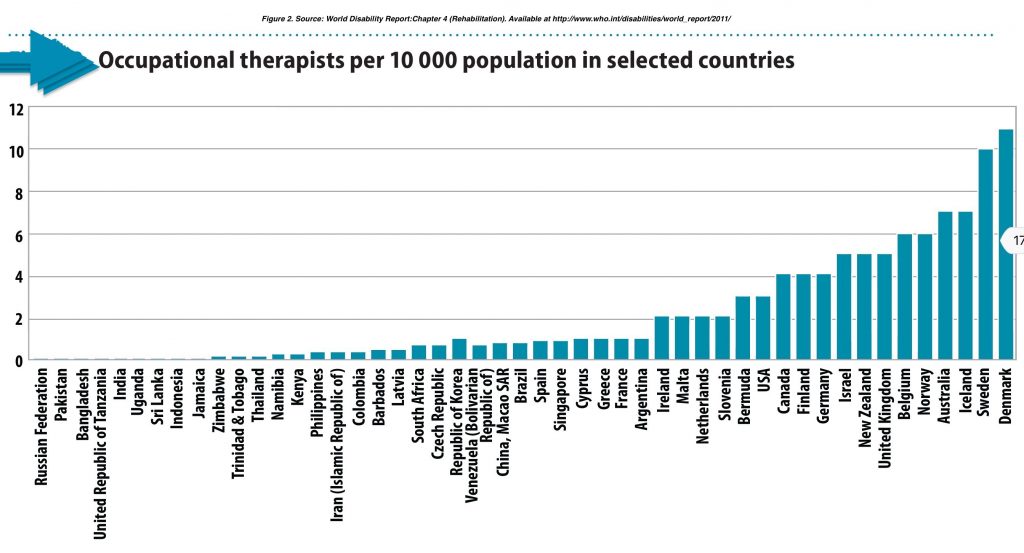Highly Qualified Personnel (HQP) and Training
Rehabilitation involves diverse groups of health care workers including but not limited to physicians specialized in physical medicine and rehabilitation, rehabilitation nurses, physiotherapists, occupational therapists, speech-language pathologists, biomedical engineers, psychologists and social workers. Most developing countries have few to no rehabilitation professionals. Most of these countries have over the years neglected the training of the rehabilitation work force due to historical, cultural, political and economic reasons. Earlier physiotherapists in countries like Ghana were trained in eastern Europe during the time of the Cold War. The WHO/World Bank ‘World Disability Report’ in 2011 highlighted this gross deficit in rehabilitation professionals in developing countries. The data showed large disparities in the supply of physiotherapists (Figure 1) and data from the World Federation of Occupational Therapists in 2010, also showed large disparities in the distribution of OTs (Figure 2).

Formal training of physiotherapists in Ghana begun in early 2000 with 150 registered physiotherapists (source), while the University of Ghana has graduated over 200 physiotherapists (source). According to Dunleavy 2007, rehabilitation personnel working in low-resource settings require extensive knowledge on pathology, good diagnostic and problem-solving skills, as well as clinical decision-making, and communication skills to complement the low number of other health professionals such as doctors.
Physiotherapists in developing countries have in most cases assumed different roles from speech therapists, occupational therapists, orthoptists and others, due to the unavailability of these professionals. I recall a number of patients with stroke who recovered their functional deficits, but couldn’t recovered their speech deficits, because there wasn’t a SLP to attend to them. Although, efforts were made to enable them recover some aspects of their speech.

Low socio-economic status of patients, sometimes prevent them from being able to travel to the physiotherapy unit for rehabilitation. This leads to delay and discontinuation of services mid-point. Thereby limiting their level of recovery. The hand therapy team from Health Volunteers Overseas (HVO) noted that, one of the main challenges of rehabilitating patients in Ghana is complications (contracture) from either late referrals or late reporting of patients to the facility. They agreed that, although the knowledge and skills to manage these patients are available, the patients don’t report to the clinic until virtually nothing can be done for them.
It is important to highlight the lack of HQP in achieving the rehabilitation 2030 agenda. This has also been highlighted in numerous WHO documents. According to Dr. Margaret Chan (former Director General of WHO) “For too long countries have seen health workers as just another cost to be managed, instead of an investment with triple return for health, economic growth and global health security.”
To attain the Rehabilitation 2030 agenda requires conscious effort by governments, non-governmental organizations and donor agencies to place rehabilitation workforce on top of their agenda.
Due to the very few rehabilitation facilities and inequities within health care delivery in developing countries, it is sometimes assumed that there are more professionals than the country can employ. However, an increasing aging population, increasing prevalence of non-communicable diseases, and infectious diseases, and a growing demand for rehabilitation, means more of such professionals are needed now, and in the future.
University training of rehabilitation professionals meet international standards, but this is not feasible in all developing countries due to shortage of expertise and the capital investment required. However, therapy assistants and technicians could be trained to provide rehabilitation services under supervision.
Part 3 of this series will focus on how ‘Teamwork’ can help in strengthening rehabilitation in health systems for developing countries.